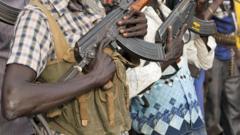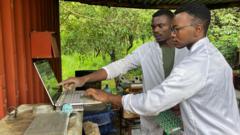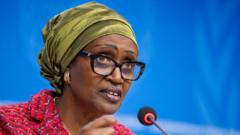Significant global health initiatives have come to a standstill, affecting vital treatment and preventative efforts for diseases like tuberculosis, malaria, and HIV following the U.S. government's recent suspension of foreign aid funding.
**Global Health Crisis Looms as Trump Administration Pauses Foreign Aid Programs**

**Global Health Crisis Looms as Trump Administration Pauses Foreign Aid Programs**
Programs aimed at combating global diseases face shutdowns due to a temporary halt on funding, jeopardizing years of progress.
As the Trump administration implemented a 90-day pause on foreign aid, vital health programs globally, including those combating malaria and supporting clinical trials, have faced severe disruptions. The halt in funding from the U.S. Agency for International Development (USAID) directly affects countries reliant on these initiatives.
In Uganda, the National Malaria Control Program has had to cease its insecticide spraying operations and the distribution of bed nets essential for protecting pregnant women and young children. Dr. Jimmy Opigo, director of the program, expressed the significant setback this pause represents for malaria prevention efforts.
Similarly, in Zambia, critical medical supplies, such as drugs to manage hemorrhages during childbirth and rehydration solutions for severely dehydrated children, have been stranded due to the halt in transportation projects funded by USAID. Trucking companies could not proceed with deliveries, leaving vulnerable populations without essential resources.
The repercussions of the funding freeze extend beyond immediate supplies. Dozens of clinical trials across South Asia, Africa, and Latin America have been suspended, leaving thousands of enrolled participants without the necessary continued care. Researchers and program managers report a widespread sense of despair as participants risk losing access to groundbreaking treatments and vital health interventions.
Interviews with over 20 affected individuals reveal the gravity of the situation and the deep emotional strain on those working in global health. Many scientists and public health officials requested anonymity to speak candidly, fearing retaliation against their projects. Their accounts highlight not only the immediate challenges but also the long-term implications for healthcare programs developed over decades that are now at risk of collapse.
As the 90-day funding pause continues, the international health landscape is left in a precarious position, threatening hard-earned gains in disease control and prevention. The broader implications of these aid cuts could undermine global efforts to combat some of the world’s most pressing health crises, emphasizing the need for urgent intervention and support.
In Uganda, the National Malaria Control Program has had to cease its insecticide spraying operations and the distribution of bed nets essential for protecting pregnant women and young children. Dr. Jimmy Opigo, director of the program, expressed the significant setback this pause represents for malaria prevention efforts.
Similarly, in Zambia, critical medical supplies, such as drugs to manage hemorrhages during childbirth and rehydration solutions for severely dehydrated children, have been stranded due to the halt in transportation projects funded by USAID. Trucking companies could not proceed with deliveries, leaving vulnerable populations without essential resources.
The repercussions of the funding freeze extend beyond immediate supplies. Dozens of clinical trials across South Asia, Africa, and Latin America have been suspended, leaving thousands of enrolled participants without the necessary continued care. Researchers and program managers report a widespread sense of despair as participants risk losing access to groundbreaking treatments and vital health interventions.
Interviews with over 20 affected individuals reveal the gravity of the situation and the deep emotional strain on those working in global health. Many scientists and public health officials requested anonymity to speak candidly, fearing retaliation against their projects. Their accounts highlight not only the immediate challenges but also the long-term implications for healthcare programs developed over decades that are now at risk of collapse.
As the 90-day funding pause continues, the international health landscape is left in a precarious position, threatening hard-earned gains in disease control and prevention. The broader implications of these aid cuts could undermine global efforts to combat some of the world’s most pressing health crises, emphasizing the need for urgent intervention and support.






















